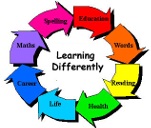Academic Services

When your Adolescent Child Underachieves
Let's start at the beginning and ask the most important question:
Who is the Adolescent?
If you have a child or children in your home between the ages of 13 and 19, you know what it means to have an adolescent/s living under your roof! It is often a tumultuous time for both the adolescent and his/her parents. But why is this sometimes such a difficult phase of life? Lets consider the following.
Adolescence is a transition from childhood to adulthood. This is a time where these young ones are suspended between being a child and being an adult. Many a times parents will tell me that their child can sometimes be so mature, and other times they are astounded at how childish the same child can be. Confusing for parents? Absolutely! But if this is a confusing time for parents, imagine how confusing it must be for your adolescent!
To become an adult, the adolescent must complete certain "tasks", and one of the most important tasks is that of autonomy. Seeking autonomy refers to your child's final "journey" to become independent and responsible. It also means that your adolescent child is trying to find some kind of control over his/her life.
Parents, who have been responsible for making decisions for their child's life for many year, must suddenly hear that they are controlling and that they do not allow their child to think and decide for himself. The point is that as children become adolescents, they see themselves no longer submissive to their parents' rules and regulations. They start to question their parents way of doing as well as their parents' authority. For some parents this change is "abnormal" and should be rectified. But a word of caution to these parents. This is a crucial stage of growth and development for your adolescent towards adulthood.
I am not saying that you should be happy to be treated as a doormat. Bad behaviour should always be managed. I am asking for understanding in that it is normal for adolescents to strive for independence and to develop an own identity; not a mere extension of their parents.
Adolescence is a time of confusion and discovery for your child. They are forever torn between difficult choices regarding schoolwork, relationships, own sexuality, drugs & alcohol and social life. Peer relationships, romantic interests and appearance becomes most important. In short, your adolescent has to contend with many physical and mental changes.
Furthermore, they have to start thinking of their future and make important career decisions. Parents and teachers put more pressure on them as academic achievements assume a new level of importance; it becomes a key factor for personal progress and personal worth. And we still ask why adolescents are so difficult?
When is your adolescent underachieving?
When do we then start to be concerned about underachievement?
We measure our child's scholastic performance based on the marks he/she achieves in tests and examinations. We also tend to ask the teachers if they are happy about our adolescent's scholastic performance- how he/she performs in comparison to his/her peers?
I think you should be concerned if your child performs well below of what can realistically be expected of him/her while all is well in the following areas:
- Your child has an average or higher intelligence;
- He/she physical development is is age appropriate;
- His/her sensory functioning is intact;
- Your child has an adequate opportunity to learn.
Let me just be very clear about this: an underachiever is not an adolescent who achieves 80% but his/her parents expects 100%! I am talking about a person who should receive a decent 60%, and is able and capable of attaining it, but for some reason just does not get there.
Once we think that our child is definitely underachieving, it becomes very important to find the reasons for underachievement. The following should now be considered:
- emotional functioning
- health factors
- home environment
- school situation
- homework and study habits/skills
- writing of tests and examinations
- social factors
By investigating these factors, we should be able to find the reasons for your child's underachievement and work on an intervention plan to address the areas of concern. There is seldom only one reason for underachievement. It is usually more complex and often it consists of a combination of factors.
A good place to start is usually by visiting n Educational Psychologist like me, for a full psycho-educational assessment. It should give us the answers we are looking for.

Barriers to Learning
How can you tell that your child a barrier to his learning or in popular parlance, a learning difficulty? This is a difficult question as the term "learning difficulty/disability" encompasses so many different problems or issues that affect a child's learning in children. A typical child with a learning disability is usually average or above-average in intelligence. This makes it very difficult for parents and teachers to understand. Furthermore, children with a learning disability often have additional or comorbid issues: emotional, social, behavioural or physical problems that can complicate both the diagnosis and treatment thereof.
In general, however, you or your child's class teacher can suspect a learning difficulty if your child does not perform as expected in reading, writing, and/or math. your child's teacher/s will be able to guide you on whether your your child is on par or well below his/her classmates' performance. Another indicator is when, despite special help, your child continues to have difficulties with more than one of the following:
Remembering information: this includes letters of the alphabet, high frequency spelling words, spelling words studied for a spelling test, times tables, instructions about homework and projects, and work you know your child has studied for tests and exams
Concentration: the teacher complains that your child has a short concentration span, and gets distracted easily. She also comments on how difficult it is to keep your child seated or focused. Your child often cannot find books or stationery and is a real scatter brain. Your child procrastinates and does not complete tasks or homework assignments. Your child continuously makes careless mistakes and is very impulsive.
Sticking with activities: Your child tends to give up easily, does not know how to start or structure it, does not tell you in advance about tasks and/or cries and refuses to do it.
Organisation: planning to complete tasks on time is a major problem; your child finds it difficult to prioritise, putting things in order and finds it challenging to make decisions.
Speaking and writing: following instructions and directions are challenging for your child, especially when attempting to follow instructions and directions. Words are mispronounced and he/she finds it difficult to learn and remember new words. Your child has a problem with understanding what he/she is reading, answering questions or retelling a story is difficult and writing an essay remains a challenge for your child.
Motor tasks: cutting, drawing, handwriting, climbing, and running are challenging for your child. Your child is clumsy and exhibits poor coordination.
Friends: your child hates to lose; is impulsive or aggressive towards friends; finds it difficult to read other people's non-verbal cues (body language) or picking up on social cues. Your child is also prone to making the "wrong" friends.
Remember that we are looking for a cluster of these behaviours and not only one isolated behaviour. I have many years experience with learning disabilities and I can help you to find the best way forward.

Study and examination skills
Most learners are not aware of the importance of good study skills to their academic success. Unless your child has been instructed on study skills, he/she will at best have collected a haphazard array of skills that have been gained over time. Having good study skills is vital to academic success; not only throughout your child's school career but also for further learning at university, technikon or college.
Developing good study skills can help your child to:
- Take responsibility for his/her own learning process
- Set practical goals
- Be aware of his/her own performance and progress
- Improve note taking and preparation for tests and examinations
- Use time wisely
- Understand and remember what he/she has learnt
Simply put, students with good study habits are more successful in their learning, achieve better marks at school and are more successful in their classes.
"Motivation is what gets you started. A good habit is what keeps you going."
Jim Ryun

Examination concessions and accommodations
Not everybody study and write tests/exams in the same way. Often people also fear tests and exams as they know there are more obstacles for them than just writing down the answers.
Children and adolescents who need concessions usually battle to complete the test paper in the given time, or their reading is poor so that they do not understand what is required from them.
Children and adolescents with a learning disability such as dyslexia, dyscalculia, dysgraphia central auditory processing difficulties, ADD/ADHD, or mild learning difficulties. often needs additional time during tests and examinations, someone to read the test/exam paper for them, scribe or do a full amanuensis for them. To receive concessions, an application must be made to the Department of Education or to the IEB Board.
I will gladly assist you and your child. To ask for concessions will require some assessments and will be discussed with you based on what is required.
I can also help your child with study skills and examination writing techniques: how to prepare for an examination or test, how to read the examination paper and how to answer an exam paper effectively.

School Visits
I will gladly visit your child's school to attend meetings with you or to discuss with your child's teachers how to best assist your child.
A school visit is usually very helpful after a full assessment where certain classroom strategies are needed to optimise your child's classroom performance. The aim is always to make school a happy place for your child where he/she feels able to achieve according to his/her potential.
I charge my normal hourly rate with an additional R400-00 to cover travelling time and costs.
"When I was 5 years old, my mother always told me that happiness was the key to life. When I went to school, they asked me what I wanted to be when I grew up. I wrote down happy. They told me I didn't understand the assignment, and I told them they didn't understand life."
John Lennon
